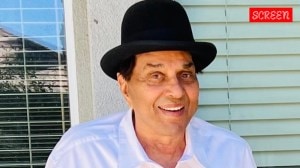Take Off Your Glasses and See
How existential questions have shaped the unique vision of filmmaker Anand Gandhi and his debut film,Ship of Theseus
How existential questions have shaped the unique vision of filmmaker Anand Gandhi and his debut film,Ship of Theseus
One day eight years ago,Anand Gandhi stopped wearing glasses. He had come across a book Take Off Your Glasses and See; the contents didnt impress him but the name struck a chord and Gandhi ditched his glasses on a whim. Last week,on a visit to an optician,he had his eyes checked out of curiosity. Although Gandhi is back to wearing glasses albeit temporarily his vision in the last eight years,he points out with glee,has improved. It was an experiment. Shouldnt I get an Ignoble for this one? he says,laughing.
Gandhi says that curiosity has driven him through his life,and it was encouraged in him by his mother and grandmother from an early age. When I was in Class III,my librarian gave me an encyclopedia and I asked my mother to stay back with me after school for a couple of hours so I could read some more. I was fascinated by the book that seemed to have answers to so many of my questions.
Gandhis interests,since his early years,have led him to explore the space between science and philosophy. Exposed to ideas of spirituality at a very young age through his grandmother,he began to doubt the certainties of religion by the time he was 13. It didnt seem to resolve the puzzle that was turning into infinite regression in his head: If god made the universe,who made god?
The 32-year-old directors life and career have since revolved around attempting to answer similar existential questions. This also forms the core of his debut feature film,Ship of Theseus,where he evokes a philosophical paradox from Greek mythology if Theseus (the founder-king of Athens)s ship was rebuilt plank by plank,would it remain the same ship,and if the older wood was used to build another ship,which then is truly the ship of Theseus?
The film questions the human understanding of beauty,non-violence and identity through three stories set in Mumbai: a blind photographer fears losing her understanding of beauty after her eyesight is restored; a monk fighting against violence is diagnosed with a liver disease and needs to consume medicine that may have been tested on animals; a stockbroker who has had a kidney transplant realises that the organ he has received may have been stolen. The film,which will release on July 19 in select theatres across India,is a bookend,Gandhi says,to all that he has learned till now.
Disillusioned by a formal education system that didnt encourage knowledge but only focussed on getting a degree,I turned to ancient Indian thought for answers at the age of 17. I took up a course in Jain and Buddhist philosophy that I didnt complete and then embarked on spiritual shopping, says Gandhi,picking and choosing ideologies on the way.
The spiritual pursuit was also accompanied by a physical one. Having trained in web design,he got offers from spiritual organisations such as the Brahmakumaris to create their websites. Among other places,he spent time at Auroville in Pondicherry and an ashram in Dehradun. He also researched the lives of Indian spiritual greats such as Kabir and Dnyaneshwar in the hope that they had found the answers he had been searching for.
In the process,Gandhi met individuals who left a mark on him and have,in many ways,inspired the characters in Ship of Theseus. At 19,he was already working on anti-Enron activist Abhay Mehtas website altindia.net,had joined Alok Ulfats theatre,performing in remote areas of the country, and was associated with the late Parag Trivedi and his cultural organisation Sabrang. Much like activist Satish Kumar who went on a pilgrimage for peace in 1962,the monk in my film walks, says Gandhi.
During this time,Gandhi started to write plays. Sugandhi,about a young nun who has begun to discover her sexuality,who questions why it is considered wrong,won several awards. Yet,his friends and family complained they didnt understand what he was trying to communicate. The realisation that his work was burdened by jargon led him to simplify the narrative and explore short films as a medium.
Cinema has always been to Gandhi the most powerful medium of storytelling and exploration. I understood so many thoughts and ideas through cinema. I grasped the fact that other senses are sharper in the visually challenged,through the phrase mann se aankhon ka kaam liya in the film Anuraag (1973). But that has been established 30 years ago and I didnt want my cinema to repeat what has been said before. I wanted it to take it further, Gandhi says,adding that he was reluctant to use the story about the blind photographer lest it sound cliched.
Gandhis first short in 2003,Right Here,Right Now,travelled the festivals circuit; it also brought him in touch with the three most important creative collaborators of his career: co-writer Khushboo Ranka,cinematographer Pankaj Kumar and co-producer-actor Sohum Shah. The film addressed the concept of karma by narrating a series of events,one led by another,and laid the foundation for Ship of Theseus. The latter,however,explores if the karmic cycle extends beyond ones own lifetime.
Although by this time the young director felt ready to make a feature-length film,it took seven years,and several rejections from producers,before work on Ship of Theseus began. The confidence that his mother had instilled in him was dented and thus began Gandhis long battle with his arrogance regarding his own genius. For the first time I had failed,and I had to accept it, he says.
The lack of work and his unwillingness to take up offers to write for television and stereotypical Bollywood films led to a prolonged period of struggle and made him doubt his capabilities. I had no money at all. Every once a year I would take up a two-day assignment that would make me some money. One year,the government asked me to write an anthem for the Indian women hockey team, he says. When his grandmother fell ill in 2009,Gandhi spent a year in the hospital nursing her. Amid vulnerabilities and disease,he reflected on and assimilated all that he had learned.
Once again,he turned to science for answers. A Douglas Adams fan,Gandhi then applied to his life the authors theory of Total Perspective Vortex from the Hitchhikers Guide to the Galaxy. According to him,the worst punishment in the world is to be able to view yourself as no more than a tiny atom of carbon in this universe. I realised I needed to think beyond the short-term plan of making a film and look at the larger perspective of learning and developing cinema that will not subscribe to rules and be honest.
But for someone who views philosophy as an extension of science and to whom emotions are merely different forms of signals the brain sends out to the body to indicate sustenance or danger,it was a challenge to not let the film get didactic. I havent done it enough number of times to deduce a formula. But with Ship of Theseus,I took the liberty of designing characters that are already evolved. For instance,the dialogue which introduces the monk Sadhu kam shastri zyada hai sets the precedent for his understanding of science that he is so vehemently against, Gandhi says.
After Ship of Theseus releases,his production house,Recyclewala Films,with Shah,who also plays the stockbroker in the film,will start to focus on other films they want to produce. The first in line is Tumbad,a period fantasy directed by newbie Rahi Barve. Sohum isnt a typical producer; he is looking to experiment and explore through cinema. Recyclewala Films is more a lab than a business venture where we are working on a 10-year plan of making cinema that isnt boring but will educate and groom us as well as the audience.





- 01
- 02
- 03
- 04
- 05


























